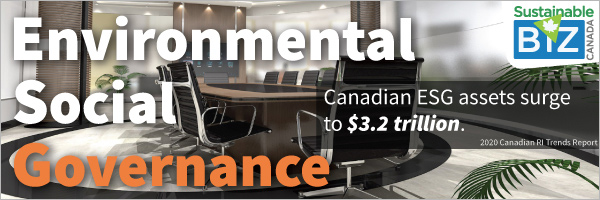Recent Articles
BMO joins Partnership for Carbon Accounting Financials
BMO joins Partnership for Carbon Accounting Financials
The Bank of Montreal, one of the world’s leading financial institutions when it comes to sustainability, joined Partnership for Carbon Accounting Financials (PCAF), a global partnership of financial institutions, to work together towards addressing greenhouse gas emissions.
Sustainable finance for a safe climate: Pembina
The Pembina Institute is making a series of recommendations toward a financing strategy that helps integrate ESG (environmental, social and governance) initiatives by enabling private capital to flow to suitable technologies and projects between now and 2030.
‘Net-zero emissions by 2050’ and ‘2°C’ climate targets
If you are truly looking for ways to maintain or establish your company as a leader in sustainability get thee to a 1.5°C science-based target. But, is a ‘net-zero emissions by 2050’ commitment worthy of being labeled ‘climate leadership’?
Ottawa’s $2.7-billion fund to electrify public buses
The federal government is ramping up plans to move Canada’s public transit fleets from diesel to electric buses with a dedicated $2.7-billion fund. This fund is in addition to the $1.5 billion for electric buses announced earlier this year by CIB.
GM close to building a second U.S. EV battery factory
• Wall Street Journal • CNBC • Energy Mix
General Motors Co. is looking to build a second battery factory in the U.S. with joint-venture partner LG Chem Ltd. expanding its investment in electric vehicles. The two companies are already building a $2.3 billion battery plant in northeast Ohio.
Bosa Properties contributes to Van. EV chargers
Canada’s Minister of Natural Resources announced a more than $119,000 investment to install 34 Level 2 electric vehicle (EV) chargers at six sites in Vancouver. Bosa Properties also contributed $156,000 to the project which brings the total cost of the project to more than $275,000.
Storing wind, solar energy without batteries
• CBC
While batteries dominate new installations, most existing storage capacity for renewable energy sources is actually pumped hydro, a 1920s technology. Surplus power pumps water into a reservoir and when the power is needed, it runs through turbines that generate electricity.
City of Hamilton and the first carbon-negative bus
• Canada Newswire • Canadian Biomass Magazine
Hamilton Street Railway is the first public transportation authority in Ontario to use RNG, to transport customers. RNG vehicle fuel is upgraded biogas; the gaseous product of the decomposition of organic waste from homes and businesses processed into green fuel.
Solar project developers face rising insurance costs
In the spring of 2019, the sky in parts of West Texas opened up, dropping hailstones that cracked car windows, damaged rooftops and caused an estimated $70-million in damages to a 180-megawatt solar project. That event got the insurance market’s attention.
Big oil faces off against clean-energy giants
A battle for clean-energy assets is brewing between green-minded oil giants and utility companies that currently dominate the fast-growing business. Portuguese utility EDP is the latest energy producer to raise its ambitions with plans to double its renewables capacity by 2025.
Morguard revitalizes 60 Bloor Street West
Morguard Corporation (MRC-T) has transformed 60 Bloor Street West in the heart of Toronto into a class-A office building seeking LEED Gold Certification. It has been reenergized with a new façade, extending and enhancing its commercial future and community impact.
CAPREIT announces release of 2020 ESG report
• Globe Newswire • CAPREIT Environmental and Resource Conservation Practices
CAPREIT (CAR-UN-T) has issued its second annual Environmental, Social, and Governance Report providing an overview of the company’s ESG strategies, policies, and commitments, and highlighting the progress made in 2020.
Window design redirects light to solar cells
• PV Buzz
A team at Rice University has designed foot-square “windows” that sandwich a conjugated polymer between two clear acrylic panels. The thin middle layer absorbs light in a specific wavelength and guides it to solar cells on the panel edges.
Why the hydrogen hype may be overblown
For those who experienced the 1990s tech bubble the renewed enthusiasm hydrogen has likely brought a sense of déjà vu. Shares in companies like Vancouver-based Ballard Power Systems Inc. soared, only to crash when commercialization of the technology failed.
Ottawa’s carbon offsets market, greenwashing potential
OPINION: The federal government is set to add a new layer to its industrial carbon-pricing system, stepping into one of the most contentious climate-policy debates. Soon, Ottawa will begin rolling out long-promised rules for a domestic carbon offsets market.
Gov’t green bonds issuance and the Canadian market
OPINION: As the recovery from the pandemic unfolds, green bonds – fixed-income securities used to finance sustainable projects – appear poised to resume their upward trajectory. Should the federal (and provincial) governments get into the action with their own green bond issues?
Climate risk infuses investment agendas
Canadian CRE assets are comparatively less exposed to the dire physical threats that extreme weather poses up in other global regions while the COVID-19 pandemic has been an instructive trial run for the ancillary risks associated with climate change.
Carbon emissions are steadily rising in GTA
Carbon emissions are steadily rising across the Greater Toronto and Hamilton Area, an alarming trend reported by The Atmospheric Fund which found that emissions increased seven per cent in Toronto and 5.2 per cent in the GTA and Hamilton Area in 2018.
Under the green roof at Hilton Garden Inn Faroe Islands
The Faroe Islands are a North Atlantic archipelago located 200 miles north-northwest of Scotland and about halfway between Norway and Iceland. Last October, the 130-room Hilton Garden Inn Faroe Islands opened on the islands in Torshavn with a bundle of unique green features.
Vienna’s green mini-city a model for sustainable living
Aspern Seestadt is nearly net-zero, meaning that its modern high-rises produce almost as much energy as they use. Globally, buildings make up around 40% of greenhouse gas emissions, but Aspern Seestadt demonstrates that it doesn’t have to be that way.
Jayman commits to energy-efficient, net-zero homes
Calgary-based homebuilder Jayman BUILT has launched a new product line in Alberta, the Quantum Performance Ultra E-Home concept, built to net-zero certification standards.
 Industry Events
Industry Events
-
Canada Green Building Council: Building Lasting Change 2024
Jun 05 2024
to Jun 06 2024
Toronto
-
Global Conference on Renewable Energy and Environmental Sustainability
Aug 16 2024
to Aug 18 2024
Vancouver, Canada











